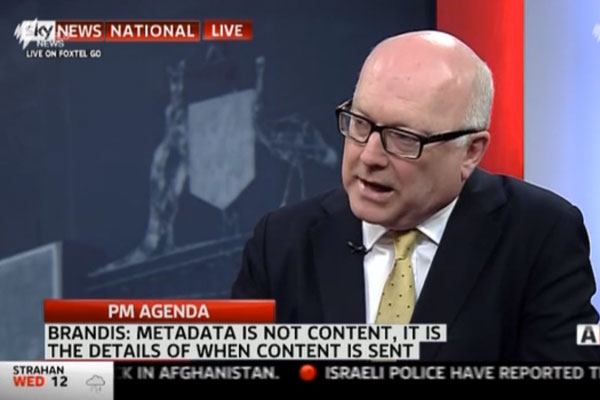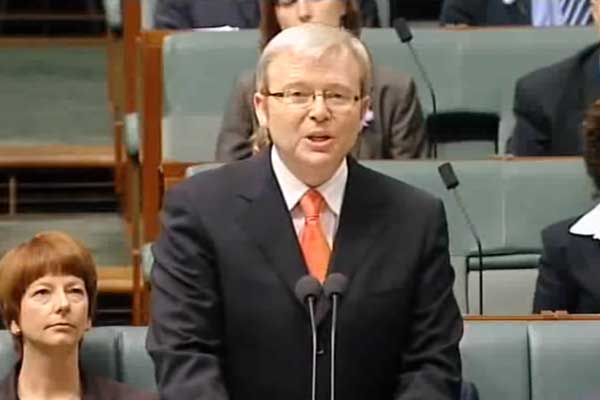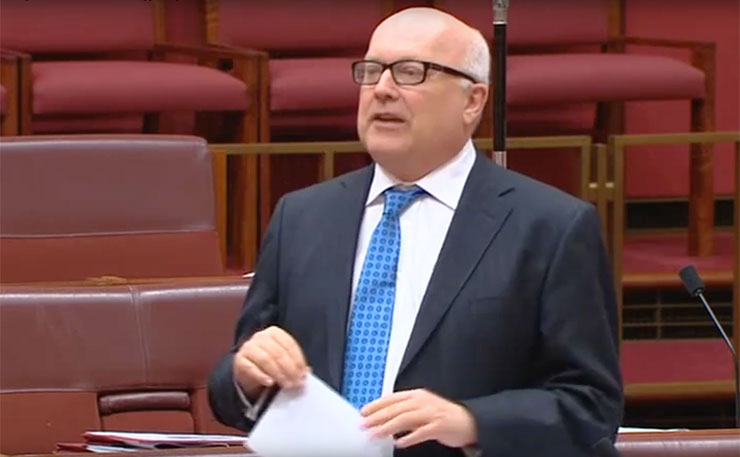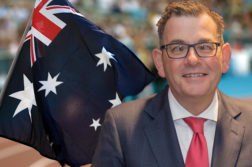PAUL Keating was never really known for being understated, particularly not in 1989, when he referred to his parliamentary colleagues as “unrepresentative swill”.
Keating was, of course, talking about ‘the other bastards’ across the hall, in the federal Senate. Because, of course, the chamber in which Keating dwelt is called the House of Representatives, and therefore must be, by it’s very definition, representative.
At least that’s the theory. The reality is something else altogether.
In politics these days, the lines – in particular the ones cooked up by spin doctors – have been blurred. Left can mean right, right can mean left, and representative can mean unrepresentative… and invariably does.
As it turns out, a censure motion – which by its very name suggests ‘punishment’ – can mean a slap in the face with a wet flannel. But we’ll return to that shortly, because to understand the circus of censure motions, you must first understand the clowns who perform them.
The very first Senate was actually based in Rome, about 700 years before the birth of Christ. While it preceded actual democracy, it was at attempt at consensus, albeit among elite Caucasian males, who sat around and pontificated on weighty public matters like sanitation, law and order and foreign invaders.
The Australian Senate of today has a few more women in its ranks, but it’s still predominantly an elitist institution dominated by white males. And they still argue about shit and drugs. And boat people, the new foreign invaders. But of course, there are differences.
Ancient Rome’s Senators were advisers to the Emperor, whereas today’s Australian Senators most often serve the opposite role. That is, to frustrate the aspirations of the ‘Emperor’.
Still, both purported to be houses of serious debate, and this week, for something completely different, the Australian Senate decided to argue about whether or not our Attorney General, Senator George Brandis is a thug.
So what attracted the ire of the Senate? Brandis’ attempts to bribe Gillian Triggs, the president of the Australian Human Rights Commission, out of her job.

In case you’ve been living under a rock – or had more important things to do than keep a watchful eye on the nation’s most dysfunctional institution – Triggs was the lead author of the recently released report entitled ‘The Forgotten Children’, which chronicled the crippling affects of mandatory, indefinite detention on child asylum seekers.
As it turns out, jailing kids is a pretty horrible thing. Who would have thought it would lead children to do all sorts of terrible things to themselves, like self-harm?
And as it also turns out, Brandis is, indeed, a thug. At least he is in the ‘ayes’ of a majority of his colleagues, who voted late yesterday to censure him for his conduct.
Truth is, Brandis is just the latest in a long line of Senators who’ve also been censured for appalling conduct.
At this juncture, it’s important to note how censure motions come about, and whether they have any real purpose, lest you mistake them as being worth the paper they’re written on.
All of the censure motions of the last 15 years – and I’ll list them shortly – have been for dirty acts. But they’re only the dirty acts that don’t win popular support on the floor of the Senate. That is, 39 or more Senators out of a potential 76 think that what you did was either bad, or worth exploiting politically. Because, of course, plenty of Senators have done plenty of bad things, and no-one raised an eyebrow.
Like Penny Wong, the ALP Senator who, without a hint of irony or a modicum of shame, moved the censure motion against Brandis yesterday. It read in part, “That the Senate censures the Attorney-General for… undermining Australia’s commitment to upholding human rights.”
Wow. What a f**king cheek.
Senator Wong, of course, was part of the government that began jailing – at record rates, mind you – the very children on whom Professor Triggs was reporting.
Senator Wong was also part of the government (and the opposition) which voted to trash the basic human rights of Aboriginal people during the Northern Territory intervention, before her party doubled down and extended it for another decade.
Now Wong and her ilk get to grandstand about Brandis the thug, when in fact he’s no bigger or smaller a thug than Wong, and everyone else in her party.
The short memories of these people is matched only by the depth of their breathtaking hypocrisy.

Which all begs the question, why even bother? What is the point of a censure motion if it’s simply a group of thugs with the numbers beating up another group of thugs without the numbers? And what happens when a censure motion is delivered? Is there any real sanction? Is anyone taken out bush and shot?
Well, the answer to the last question is, sadly, no. There is no real point to a censure motion, no real sanction. It’s just a collective tut-tutting and finger wagging from people who oppose you politically.
It is ‘100 per cent political stunt’, and has no legal affect whatsoever. In this specific case, it enables the Labor party to score low-rent political points on an issue for which they should themselves be condemned.
It also enables the Labor Party to not debate their part in the mandatory, indefinite jailing of children by a nation that prides itself on the notion of a ‘Fair go’, but which built itself on stolen land with genocidal purpose.
As I mentioned, Brandis is the latest in a long line of folk who fell foul of the numbers, and one of three Ministers to have been censured in the life of this current parliament.
The first was Assistant Health Minister Fiona Nash, who was censured a year ago for misleading parliament after her chief of staff trashed plans for a government website aimed at promoting healthy eating. He was a former lobbyist for junk food companies. Quelle surprise.
The second was former Minister for Defence, David Johnston, censured in November last year for his comments about the capacity, or rather lack thereof, of the Australian Submarine Corporation, which he described as being unable “to build a canoe”.
A look back over the last 15 years of censures is even more illuminating.
In 2000, Minister for Indigenous Affairs, John Herron was censured after the government was caught ‘push polling’ in a survey of Australians about ‘reconciliation’ (with questions which sought to remind those surveyed that Aboriginal people got ‘special rights’). This was dressed up as part of a ‘reconciliation initiative’.
In March 2002, Senator Bill Heffernan was censured for falsely accusing a High Court judge of being a paedophile. He would later go on to repeatedly refer to a colleague as a “poofter” during a Liberal party meeting.
In 2003, the Government and Prime Minister John Howard were each censured for Australia’s involvement in the war in Iraq, an invasion based on lies which claimed the lives of hundreds of thousands of innocent people, and is still claiming lives more than a decade later.
In 2004, then Defence Minister Robert Hill was twice censured for his conduct in office. The first was over the government’s involvement in a ‘clarifying statement’ issued by then Federal Police Commissioner Mick Keelty. In a rare display of Canberra honesty, Keelty theorized publicly that Australia’s involvement in the war in Iraq made our nation a greater target for terrorists.
Keelty’s position was at odds with his employer, which maintained, with a straight face, that participating in an illegal massacre would both serve our national interest and make us safer (it’s a position that, 10 years later, the government of the day is trying re-package and re-sell). Despite the censure, the government spin found an unlikely ally in then Chief of the Army, Peter Cosgrove.
Hill was also censured in June 2004 for his “failure to respond adequately to reports of abuse of Iraqi prisoners by United States of America personnel”. You remember that one. Abu Ghraib. Where our allies tortured some of the Iraqis we didn’t end up killing.
On May 11, 2005, Amanda Vanstone, as Immigration Minister, was censured for the government’s treatment of Vivian Solon, a mentally ill Australian citizen (of Filipino origin) who was wrongly deported, and left in a wheelchair at the Manila airport. When the government realized their mistake, they hid the Solon file for two years, and left her to rot in the Philippines after resolving not to tell her family where they’d dumped her.

And prior to this current government, the last successful censure motion was moved in February 2010, against the Rudd government. It was for failing to adequately deliver programs to tackle climate change, a worthy censure motion but not without its own beautiful irony, given it passed with the support of the Abbott opposition… who in government would go on to become the first nation on earth to actually abolish a carbon tax while the planet warms.
At the risk of pointing out the bleeding obvious… what a rap sheet. If these people were a criminal syndicate – and I’m not suggesting they aren’t – Campbell Newman would have already outlawed them (unsuccessfully) by now.
But the greatest outrage is not their collective crimes. It’s their individual sentences, which are worth recapping.
John Herron resigned from parliament in 2002, and was appointed the Australian Ambassador to Ireland and the Holy See. He was also made a Papal Knight of St Gregory, an honour bestowed to crusty old white men by the Vatican. On his return to Australia, Herron was appointed chairman of the Australian National Council on Drugs, and later an Officer of the Order of Australia.
Bill Heffernan remained a Senator in the Australian Parliament, and when he does eventually retire, he will have clocked up at least two decades in parliament with a parliamentary pension to match.
John Howard was voted out of office in 2007, and retired with a swag of honours, and a reported $250,000 pension, plus $300,000 a year to run his office and jet him around the country.
Robert Hill retired in 2006, and was appointed Australia’s Permanent Representative to the United Nations. When he returned from overseas, he was awarded a Companion of the Order of Australia. And the man who publicly backed him over the Keelty affair, Peter Cosgrove, is now the Governor General of Australia.
Amanda Vanstone retired from politics in 2007, and was appointed Australia’s Ambassador to Italy. In 2013, Tony Abbott appointed her to his National Commission of Audit.
And what of Fiona Nash, David Johnston and George Brandis?
Nash is still the Assistant Minister for Health. Johnston was stripped of the defence portfolio, but he still occupies a seat in parliament, and will also retire with a juicy pension.
And Brandis, of course, is still the Attorney General, and earning a salary about five times greater than the average Australian wage, plus perks. Federal police are ‘investigating’, and will, in due course, announce there are no charges to answer.
The point being, all of the people censured by the Senate for doing things that would result in ordinary citizens facing the courts have escaped with no real sanction at all, and retired with taxpayer-funded perks that would make Christopher Skase blush.
Meanwhile, Aboriginal people still live desperately short lives marred by poverty, incarceration and misery; children are still in detention and we still jail asylum seekers indefinitely, without charge; Vivian Solon will never fully recover from the scars of her ordeal; hundreds of thousands of Iraqis are still dead, and many more will continue to die; the victims of Abu Ghraib – and other people falsely charged, tortured and imprisoned, like David Hicks – will never be compensated; the junk food czars will continue to poison our community; and the Australian Submarine Corporation still can’t build a canoe.
While obviously not every politician is bad, in hindsight, ‘unrepresentative swill’ seems woefully inadequate.
Donate To New Matilda
New Matilda is a small, independent media outlet. We survive through reader contributions, and never losing a lawsuit. If you got something from this article, giving something back helps us to continue speaking truth to power. Every little bit counts.




